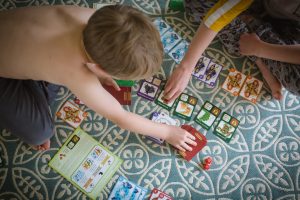Deschooling: What Is It, and Why Should You Do It?
When families come to me wanting to leave traditional school and “come to the dark side,” my first bit of advice is almost always to do a deschooling period, and I am almost always met with confusion and worry.
Unstructured time? Won’t they fall behind? What do mean do nothing? For how long? But, won’t they fall behind?
Before we get into what deschooling is, I think it’s important first to discuss why it’s necessary.
Why should I Deschool?
Traditional education models, including public and private schools, have many practices in place that are designed to control and educate a classroom. Anyone who has ever spent time as a room parent, or helped out with a class party, knows it can quickly get chaotic. This looks and feels very different than managing and educating an individual, or even a few individuals in the case of multiple children.
While public and private education appear to be changing, several things remain true:
- State standards set curriculum and schedules
- Testing is used to assess learning
- Students are required to stay seated and quiet for much of the day
- Teaching is done in large groups
- The majority of students must master concepts before progression takes place
- Learning is done during scheduled times
- Topics and subjects are taught at prescheduled times

None of these things are true in homeschooling. Learning happens all the time in many different settings. There are no set schedules, except the one you determine is best for your family. Your child can sit, or stand, wherever they want – in a tree, the hammock on a nice day, their favorite cozy chair, the kitchen table – the options are limitless. Learning happens one-on-one or in small groups, and children can delve as far into a topic as they want. They can continue to learn about a topic that interests them for hours, days, or even weeks, learning the intricacies and related topics before moving on; or they can learn the basics and keep going. Learning occurs all the time, everywhere. Conversations over dinner, field trips, and leisurely Sunday walks through the neighborhood all become opportunities to learn. You get to choose the curriculum and schedule, and whether or not to test (most homeschool families do not, save proof of progress).
Often it is necessary to take a step back, disconnect from your beliefs about education, explore all of the options available, and see what works best for you and your child.
Now that we know why, what IS Deschooling?
Deschooling is simply taking a break and focusing on learning your child. Traditional schooling takes the reins and tells the parents what’s best for their child’s education. It will take some time to understand your child’s learning patterns, strengths, and weaknesses.
It is ignoring the often-repeated public school worry…
They will *gasp* fall behind!
And instead, trusting yourself, your child, and your intuition. Falling behind only matters if they are in a classroom of students who need to all be on the same page for the system to work.
There was a study that concluded if no math were taught until your child reached age 10 (or about 5th grade-level), it would be possible to teach, in a one-on-one setting, all of that math in less than a year.

What Deschooling isn’t
The well-known truth is that every child, and every family, and every environment is different. This means you may find that your child, or you, need a little structure or planned activities. That’s okay! Add them in as needed, create a routine and see how it works. Tweak it as you go. Plan some activities. Sign up for a free trial for that latest online curriculum and spend a week or two in a routine. Then ditch it and try something else. Deschooling does not mean you can not do any formal education. It only means you let go of any preconceived notions or expectations and let your child guide you.
How long do we need to Deschool?
There is no hard-and-fast rule. A few days, weeks, months, an entire school year, or more? It is up to you! Deschool until you believe that you can do this!
There are countless theories and possibilities in home education. Deschool until you feel you’ve tried all the options you want, and have a starting point.
Deschool until you’re comfortable with the idea of educating your own children.
And when things get uncomfortable, and you feel a change is needed, deschool again.
So take this time to relax, have fun, and figure out what you truly want your home education journey to look like…for now…because it will likely change in the future!
Jess Koller has been home educating her three children since Kindergarten and is now entering her 4th year. She also works part-time as an oncology nurse. She has two bachelor’s degrees in psychology and nursing. She and her family enjoy being outdoors, camping, hiking, fishing, and kayaking. She enjoys crafting and reading in her spare time and has recently found a love for woodwork and furniture building.
Opinions expressed by individual writers in this blog do not necessarily reflect the views of the Board of Directors of The Organization of Virginia Homeschoolers, nor do they represent an official position of VaHomeschoolers. Writers’ views are their own, and readers are encouraged to research and explore homeschooling issues to their own satisfaction.
